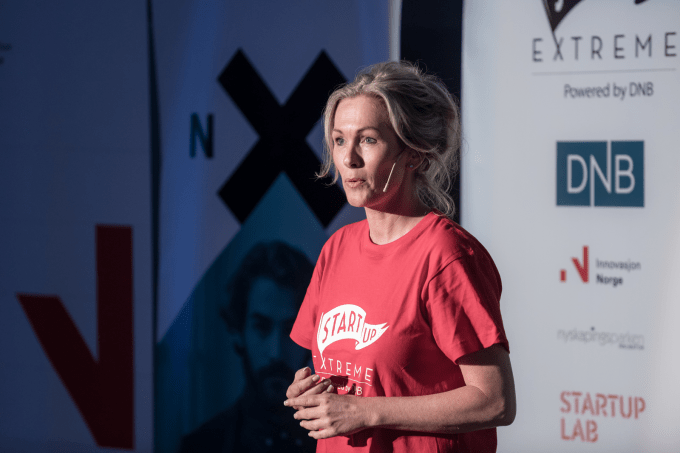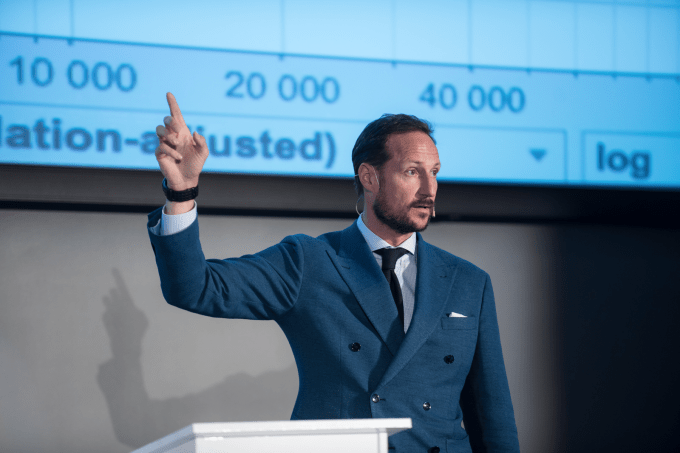With oil prices plummeting, countries blessed with natural resources are feeling the heat and Norway is no exception.
Politicians responding to the oil troubles are heeding
calls for a new way forward, centered around startups. And the efforts
to foster a new approach are led by an ambitious ex-business exec, the
Crown Prince of Norway and a handful of contrarian entrepreneurs.
Norway has seen the value of its state-owned oil and gas fields fall
by more than $50 billion, or nearly a third, in the last two years, according to a report by Rystad Energy. Over 36,000 oil jobs have disappeared — not a small number for a population of 5.1 million.
Anita Krohn Traaseth, the CEO of Innovation Norway, the Norwegian government’s instrument for innovation and development, says that it’s time for Norway to look beyond oil.
“Norway needs to develop and build several growth sectors to contribute to a more diversified and sustainable national economy.”
Norway has produced some industry leaders, such as Aker Solutions and Kongsberg Gruppen, but most, if not all of them, are offshoots of the country’s energy sector.
Compared to its startup-breeding Nordic neighbours — Sweden (in a league of its own), Denmark, Finland, and even Iceland — Norway is faring poorly.
In 2015, the country’s share of investments was a meager
8.85% – or 30 investments – of the entire pie of 339 investments. The
total amount of investments in 2015 was $1.82 billion, with Norway
taking home $85.4 million, finishing dead last.. While Nordic countries
top most lists that measure the attractiveness of different regions for
startups, Norway is missing from most charts.
“One of the main challenges for the local startups is the lack of
private capital towards for startup and growth companies,” said Karen
Elisabeth Ohm Heskja, Chief Startup and Growth Officer at Nordic Edge Expo.
Perhaps a sign of its oil and gas worries coupled with a sense of urgency, the number of investments
in Norwegian startups is up by 300% in 2016. In this year alone, Norway
has seen 28 investments, two shy of the total number in 2015.
Innovation Norway
One of the central players driving Norway’s startup scene Innovation Norway,
headed by Krohn Traaseth. The fund invests on behalf of the government
and its ministries, with a total value of 25.3 billion NOK ($3 billion)
and in 2015 distributed 6.1 billion NOK ($729.5 million) to Norwegian
businesses of which 30 percent were startups.

Anita Krohn Traaseth speaking at Startup Extreme. Image by Dan Taylor.
“The fundamentals in Norway to make a successful
transformation are solid. We still have low unemployment rate, we still
have a huge capital reserve to make necessary investments for the
future, we have a strong growth of entrepreneurial focus and companies.
This is all about how we prioritize, reposition investments, build
competence and have the guts to make important, and maybe radical
political decisions today, to secure tomorrow.”
Although the pace of change is slow, the shift from oil to new industries is happening.
“In the last year we have seen new initiatives emerge that fuel alternative technology such as Nordic Edge (Smart City), Spaceport Norway (Space industry) Norwegian Smart Care Cluster (transfer of knowledge from oil and gas to health care) and others,” said Ohm Heskja.High wages in the oil industry have also played a role in attitudes toward other industries.
“Many industries have been starved of expertise in technology-based careers, because they have been unable to compete with wage levels in the oil industry That has changed, benefiting technology-dependent industries outside of oil and gas, as well as the public sector,” Ohm Heskja says.
Royal help
In addition to the government’s investment activities and
new promising initiatives, the country’s most popular monarch, the Crown
Prince Haakon has taken an active role in leading Norway’s transition
by supporting the creation of a viable startup culture. Visiting Silicon
Valley in 2013, Prince Haakon told TechCrunch about Norway “constantly trying to foster a culture of innovation.”
Prince Haakon has lent his name to support Norwegian
startups by visiting local events. In mid-June he kicked off the second
annual Startup Extreme event in Bergen, a city on the west coast of Norway.

Prince Haakon speaking at Startup Extreme. Image by Dan Taylor
Plenty of work ahead
Although the country’s government and royalty seem to have local startups’ back, problems remain.“Regulations remain an issue. The cost of raising a new seed or venture fund as a first-time manager is simply too high for smaller funds. This means we’re are losing out on important competent capital,” said Rikke Eckhoff Høvding, the CEO of Norwegian Venture Capital & Private Equity Association (NVCA). “Secondly, in the earlier stages, we’re hoping the government will follow the lead of the UK and Australia and introduce tax incentives for investments in early-stage companies.”
The problems are exacerbated by an investment mentality
that favors the old (gas and oil) at the expense of the new (emerging
tech).
“The government is still to reluctant to take the necessary
steps in the tax and regulatory systems to enable us create generations
of successful entrepreneurs, employees of startups and Angel investors.
We need more people exposed to starting, working for and investing in
startups – and failing or succeeded at it,” said Johan Brand, cofounder
and the CEO of Kahoot!,
an educational gaming platform headquartered in Oslo. “This is the only
way to create generations that are good at it. They (the government)
are scared to take unpopular decisions now, that will benefit us long in
the term. We currently lack people who are visionary on behalf of the
nation.”
Brand is also deeply skeptical of the Norwegian
government’s willingness to publicly support initiatives that are not
oil related. With all the criticism, Brand believes that Norway can
create successful companies outside of the energy sphere and in spite of
the government.
“I believe there is a huge untapped potential in the
Norwegian economy with the highly skilled industrial sectors serving the
oil industry once applied to other consumer sectors,” said Brand.
Frode Jensen, another local entrepreneur, the founder of SociusLive and another skeptic would would like to see changes on a larger scale.
“Programs like Innovation Norway will not have a
significant impact. But it’s a good start but we need bigger, systematic
changes,” he said.
“It has been debated in Norway for decades that we should not grow
dependent of the oil industry, yet we did. Of course it’s been a hugely
important sector to enable our society to become as prosperous as it is
today,” said Brand. “However, we still let ourselves grow dependent at
the expense of investing and taking on the costs of building up other
sectors.”
Oil – too much of a good thing?
When it comes to natural resource rich countries and
oil-dependency, Norway is an anomaly. Compared to OPEC countries like
Saudi Arabia, Iran and Iraq, Norway has a rich democratic tradition
similar to its equality-obsessed neighbors in northern Europe. But even
for a country like Norway, the overabundance of natural riches might
hinder its development into a startup nation.
Although Norway continues to be a strong player in oil and
gas, many Norwegians have embraced the most truthful cliche ever
uttered: nothing lasts forever. The country will continue to dominate as
an oil and gas nation in the short run, but this might not be enough to
support a generous welfare system that offers fathers a paid four month
leave from work.
No comments:
Post a Comment